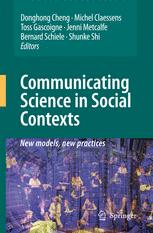

Most ebook files are in PDF format, so you can easily read them using various software such as Foxit Reader or directly on the Google Chrome browser.
Some ebook files are released by publishers in other formats such as .awz, .mobi, .epub, .fb2, etc. You may need to install specific software to read these formats on mobile/PC, such as Calibre.
Please read the tutorial at this link: https://ebookbell.com/faq
We offer FREE conversion to the popular formats you request; however, this may take some time. Therefore, right after payment, please email us, and we will try to provide the service as quickly as possible.
For some exceptional file formats or broken links (if any), please refrain from opening any disputes. Instead, email us first, and we will try to assist within a maximum of 6 hours.
EbookBell Team

4.4
72 reviewsScience communication, as a multidisciplinary field, has developed remarkably in recent years. It is now a distinct and exceedingly dynamic science that melds theoretical approaches with practical experience. Formerly well-established theoretical models now seem out of step with the social reality of the sciences, and the previously clear-cut delineations and interacting domains between cultural fields have blurred. Communicating Science in Social Contexts examines that shift, which itself depicts a profound recomposition of knowledge fields, activities and dissemination practices, and the value accorded to science and technology.
Communicating Science in Social Contexts is the product of a long-term effort that would not have been possible without the research and expertise of the Public Communication of Science and Technology (PCST) Network and the editors. For nearly 20 years, this informal, international network has been organizing events and forums for discussion of the public communication of science.
This valuable tool is recommended for those interested in teaching people how to cope in a society dominated by science and technology, particularly researchers, science journalists, science museum and science centers staff, academic researchers who study aspects of PCST, scientists who interact closely with the public, press and public information officers of scientic institutions, science theater directors, and anyone interested in issues related to science communication.